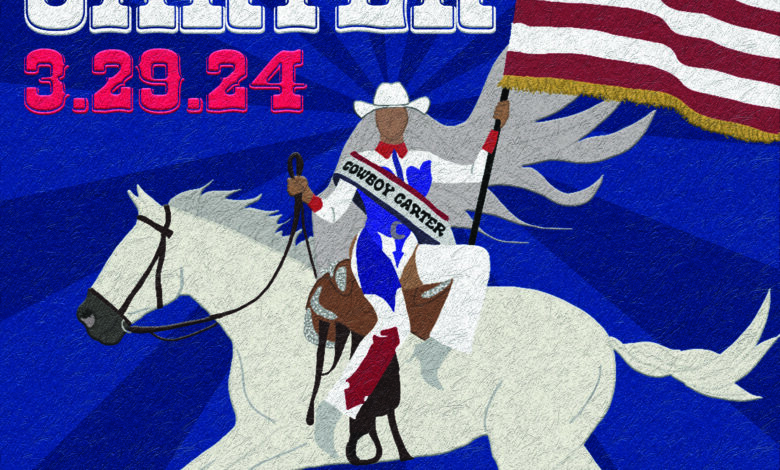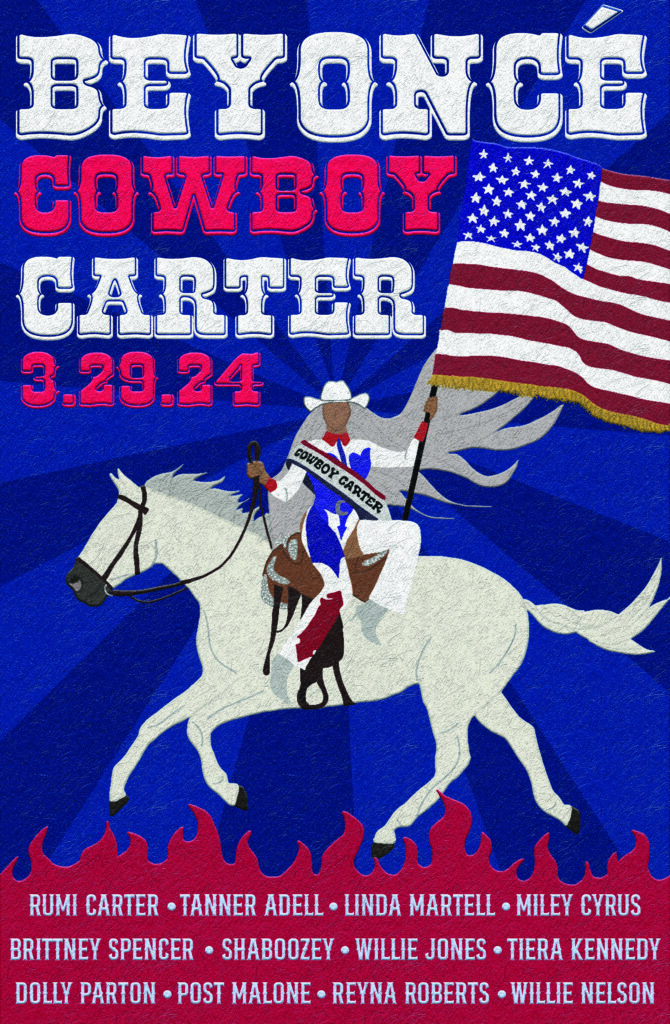
Beyoncé’s ‘Cowboy Carter’ is making history
By Asha Burtin
In an Instagram caption on March 19, Beyoncé announced her eighth album, “Cowboy Carter,” which was released on March 29: “This album has been over five years in the making. It was born out of an experience that I had years ago where I did not feel welcomed … and it was very clear that I wasn’t. But, because of that experience I did a deeper dive into the history of Country music and studied our rich musical archive.”
Many believe that this part of her statement had to do with the racist backlash she received from country music “fans” after her performance at the Country Music Awards with The Chicks in 2016, when they performed her country tune “Daddy Lessons,” from her pivotal 2016 album “Lemonade.”
Fast forward eight years later, and we have an album that has redefined so many sounds within the genre, an album that will forever serve as commentary on music’s history. “This ain’t a Country album. This is a ‘Beyoncé’ album,” stated the singer in her Instagram caption.
The elaborate 27-track album starts with the song, “AMERIICAN REQUIEM,” which appears to sample “1812 Overture,” by the composer Tchaikovsky, a song that is often played on July 4. Beyoncé sings, “Nothin’ really ends/For things to stay the same, they have to change again/Hello, my old friend/You change your name, but not the ways you play pretend/American Requiem/Them big ideas (Yeah), are buried here (Yeah)/Amen,” in the first verse followed by a chorus singing “Can we stand for something?/Now is the time to face the wind.”
The grand opening of a song with vocals that feel reminiscent of Queen’s “Bohemian Rhapsody” sets the stage for how robust the album truly is. As she sings about America’s requiem, which is essentially its death, this layered message directly applies to the singer, a Black woman from the South who was criticized for her audacity to take up space in the genre, despite its origins, and how she has chosen to break down the barriers that people have tried to place in front of her, which redefines America in a way that many people are not comfortable with. She sings, “Got folk down in Galveston, rooted in Louisiana/Used to say I spoke, ‘Too country’/And the rejection came, said ‘I wasn’t country ‘nough’/Said I wouldn’t saddle up,/but/If that ain’t country, tell me what is?,” in the second verse of the song.
It is hard to pick out one or two tracks that truly stand out in this project, as each track truly tells a story of its own. Beyoncé covers popular classics on this album, like track two, “BLACKBIIRD,” a rendition of the hit Beatles song accompanied by rising Black women in country music, Tanner Adell, Brittney Spencer, Tiera Kennedy and Reyna Roberts. Paul McCartney stated that the song was written in 1968 in response to the Little Rock Nine, as he explained that the word “blackbird” was a play on the words “Black girl,” as “bird” is a word used to refer to a girl in England.
Beyoncé also sings a new and direct rendition of “JOLENE” on track 10, a take on the Dolly Parton classic. The features on this album are so interesting, with appearances from Willie Nelson, Dolly Parton, Post Malone, Miley Cyrus and Linda Martell, a name that may not be familiar to many, but one that is important.

By Maggie Kleiner
Martell was the first commercially successful Black woman in Country music, and the first to sing at the Grand Ole Opry in 1969. Martell states, “Genres are a funny little concept aren’t they?” at the start of track 12, “SPAGHETTII,” featuring the artist Shaboozey. This high-energy hip-hop track serves an important role in the album, signifying the importance of Southern hip-hop, a pioneering sound that came from artists like OutKast, Lil Wayne, T.I., Goodie Mob and more.
The songwriting credits for each song continue to roll out as the days go by following the release of this album, ranging from rising stars like Ryan Beatty, known for his collaborations with the group BROCKHAMPTON, and rising pop and R&B artist RAYE.
The collaborations on this album were so deliberate with more credits from producers like The-Dream, Stevie Wonder, D.A. Got That Dope, Pharrell Williams and more. This project is steeped in history, with “SWEET HONEY BUCKIIN’” being a Jersey club remix of the 1961 Patsy Cline classic, “I Fall to Pieces,” as well as the genre as a whole having its roots in Black traditions, as instruments like the banjo were brought from Africa by enslaved people.
The album closes with the song “AMEN,” a reprise to “AMERIICAN REQUIEM,” suggesting that we are stuck in a cycle, and in order to break it, we must learn our history in order to not repeat it. Throughout the album, Beyoncé defies what can and “cannot” be done within a genre, whether that be singing in different languages, such as her rendition of the Italian concert piece “Caro Mio Ben” in the 11th track, “DAUGHTER,” or the Tina Turner-esque song “YA YA.” We should allow this album to serve as a lesson on not just country music’s history, but history as a whole, and the music that has reflected that.



